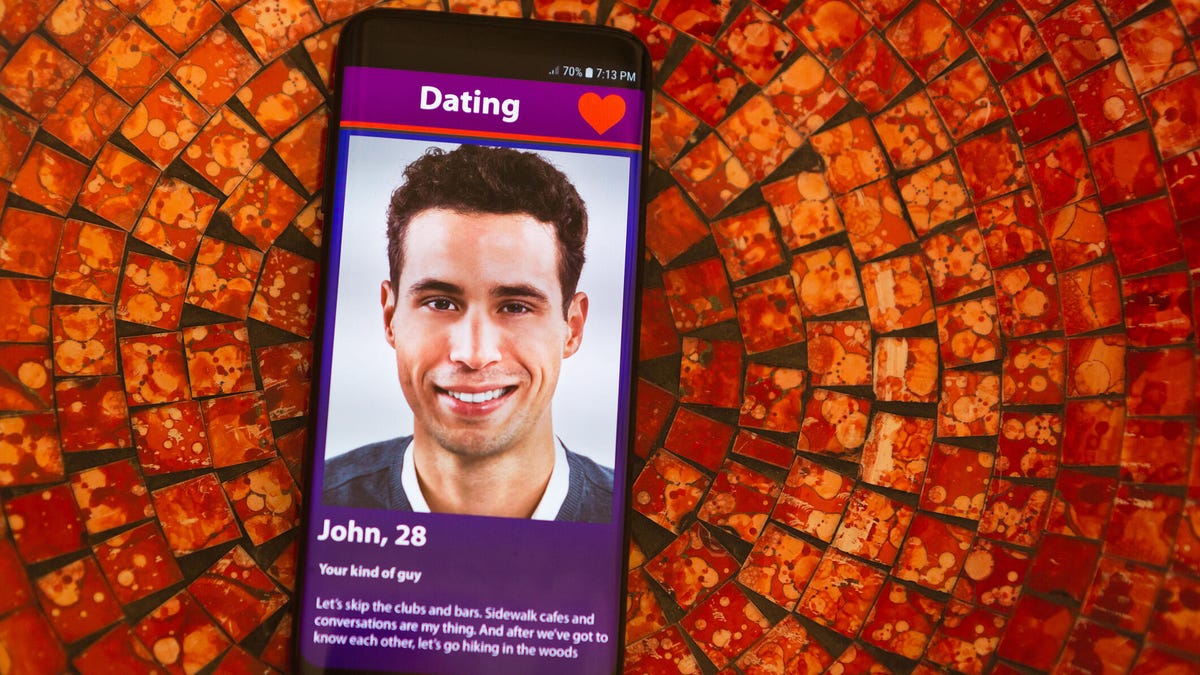Between scam artists, flat-earthers and married couples looking for a third wheel, it can be tough out there for online daters. Trust me.
A new survey from antivirus and anti-malware company Norton underscores this point, finding mixed reactions to AI among singles looking for love. On the one hand, there’s excitement about AI’s potential to improve the online dating experience for app-using singles. On the other, AI is helping bad actors make it harder than ever to find love.
As generative AI tools improve, we’re moving beyond the “grotesque abominations” of the AI-generated images of 2023 when hands were missing fingers and mouths were disjointed, though many AI images still have some glitches. Now companies like Adobe, Google and OpenAI are releasing tools that allow virtually anyone to spruce up a profile image — or cook up a stunning but completely fictitious one.

AI chatbots are also wizzes at creating and refining emails, essays, poems and more, so why not a dating profile? These word-savvy tools could help even the most tongue-tied of lonely hearts render a heart-stopping profile and pickup line(s) that would put Casanova to shame. (For reviews of AI chatbots and image generators like Gemini, ChatGPT and Dall-E, along with explainers, tips and the latest AI news, check out our new AI Atlas guide.)
For online daters, this is both a blessing and a curse, as bad actors also have access to these tools and it’s increasingly difficult to determine what’s really real at first blush.
AI for good
A majority of respondents to the Norton survey (64%) said they’re intrigued by the idea of using AI as a “dating coach” and to increase their chances of finding The One.
Of those currently using a dating app or service, 71% said they’d consider using AI to write pickup lines and conversation starters, while 70% said they want AI for profile optimization and 64% are interested in AI for photo enhancement.
Others want help from AI in writing breakup texts, and some are even interested in using AI avatars to go on virtual dates.
A February study from computer security company McAfee found that 45% of men were considering AI to write messages for Valentine’s Day, which turned out to maybe not be the best idea.
Norton attributes this willingness to experiment with AI to the investment that modern-day daters make in finding love. The survey found that the average single person who uses dating apps spends six hours a week on these apps and $300 over the course of their dating journey, though it wasn’t clear on what exactly.
AI for bad
At the same time, online dating scams have increased by 72% since just 2023, Norton found.
Nearly one-third (27%) of Americans who’ve used a dating app have been targeted by a scam, and 42% of this group have been duped, according to the survey. Another 30% report being catfished.
“Romance scams aren’t new, but AI is changing the game and making these types of scams more common and much harder to spot,” Leyla Bilge, director of Scam Research Labs for Norton, said in a statement.
How to protect yourself
According to Norton, education and awareness are the best ways to shield yourself from dating scams, AI-enabled and otherwise. But there are additional steps you can take to keep yourself safe.
First, ask for recent photos to verify the identity of the person you’re talking to. If they sidestep or refuse, it’s a red flag.
Also be wary if a potential match continues to delay meeting in real life.
It’s important to remember that potential matches can record video chats and then use that material to blackmail you, so proceed with caution.
Never click on links from matches. Scammers can pose as members to send links to porn or webcam sites — or malicious sites that download malware or steal your credit card information.
Finally, if the conversation doesn’t seem quite right, you could be interacting with a bot. Once again, the objective is to get you to click on links. And it’s better to be safe than sorry.
“People need to stay vigilant for signs of romance scams, such as individuals who avoid video or phone calls, have very few images on their dating profiles or attempt to progress the relationship quickly,” Bilge said.
The Norton study was conducted online in the US in March among 1,003 adults ages 18 and older.
Editors’ note: CNET used an AI engine to help create several dozen stories, which are labeled accordingly. The note you’re reading is attached to articles that deal substantively with the topic of AI but are created entirely by our expert editors and writers. For more, see our AI policy.
